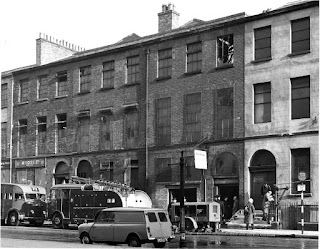A distressing case in 1895 saw a woman jailed for two months after being prosecuted when her baby daughter died in the workhouse.
On 13th September 1895 Inspector Cole of the National Society for Prevention of Cruelty to Children (NSPCC) attended 25 Rodick Street in Woolton, the home of a middle aged widow named Mary Rawlinson. It was a distressing sight, with Mary sat behind a box in which her six month old daughter was lying. The poor infant was emaciated, wearing wet clothes and covered in vermin. Two other girls, nine year old Mary and seven year old Ann were naked and also had vermin swarming all over them.
 Inspector Cole pleaded with Mary to take her children into the workhouse in Whiston but she refused, saying she would rather die on the streets than go there. She did however agree to go the following day and baby Alice was immediately taken from her and examined by a doctor. She was found to be almost skin and bone, weighing only seven and a half pounds, as opposed to the expected twelve pounds and four ounces for a baby of her age. Her skin was also covered in bites and sores and she died ten days later.
Inspector Cole pleaded with Mary to take her children into the workhouse in Whiston but she refused, saying she would rather die on the streets than go there. She did however agree to go the following day and baby Alice was immediately taken from her and examined by a doctor. She was found to be almost skin and bone, weighing only seven and a half pounds, as opposed to the expected twelve pounds and four ounces for a baby of her age. Her skin was also covered in bites and sores and she died ten days later.
Dr Hall from the workhouse refused to issue a burial certificate and referred the matter to the coroner. On 30th September an inquest was held at Whiston workhouse and three women all said they had nursed Alice while her mother worked as a laundress in Cressington. They denied neglecting her in any way and felt she was healthy.
The doctor revealed that the postmortem had shown death was as a result of congestion on the brain and asked if this was down to neglect, he replied that it was his suspicion that it was. Mary denied any neglect, saying that she often went hungry herself to ensure her children were fed. She told how she used to receive three shillings a week relief from the guardians but this was withdrawn as Alice was illegitimate.
The Coroner Samuel Brighouse expressed concern at the withdrawal of relief and asked Reverend Sylvester from the guardians to explain this. He insisted that it was only 'outdoor relief' that wasn't paid, and that Mary could be accommodated in the workhouse. Asked why this was, he said that paying money in the community would encourage women to have more illegitimate children. This received a rebuke from Brighouse, saying that the other children shouldn't be made to suffer as a reslt of this.
 The jury returned a verdict of death by natural causes, saying they didn't believe Mary's actions had contributed to the death. However the NSPCC continued with the prosecution. On 4th October at the Woolton Sessions it was heard how Mary's husband had died a few years earlier and although she worked hard, she was also of drunken and dissolute habits. The prosecutor said that they were not seeking a manslaughter conviction, rather one for neglect of all three children, with that being a factor in Alice's death.
The jury returned a verdict of death by natural causes, saying they didn't believe Mary's actions had contributed to the death. However the NSPCC continued with the prosecution. On 4th October at the Woolton Sessions it was heard how Mary's husband had died a few years earlier and although she worked hard, she was also of drunken and dissolute habits. The prosecutor said that they were not seeking a manslaughter conviction, rather one for neglect of all three children, with that being a factor in Alice's death.
Evidence was heard from Dr Hall and a portress as to Alice's condition on being taken to the workhouse. They were of the opinion that she was improperly fed and that the bedding had been greatly neglected. After being found guilty the chair of the bench said it was some of the most harrowing evidence he ever heard. Saying he was sure neglect had accelerated death, he sentenced Mary to two months imprisonment with hard labour.

